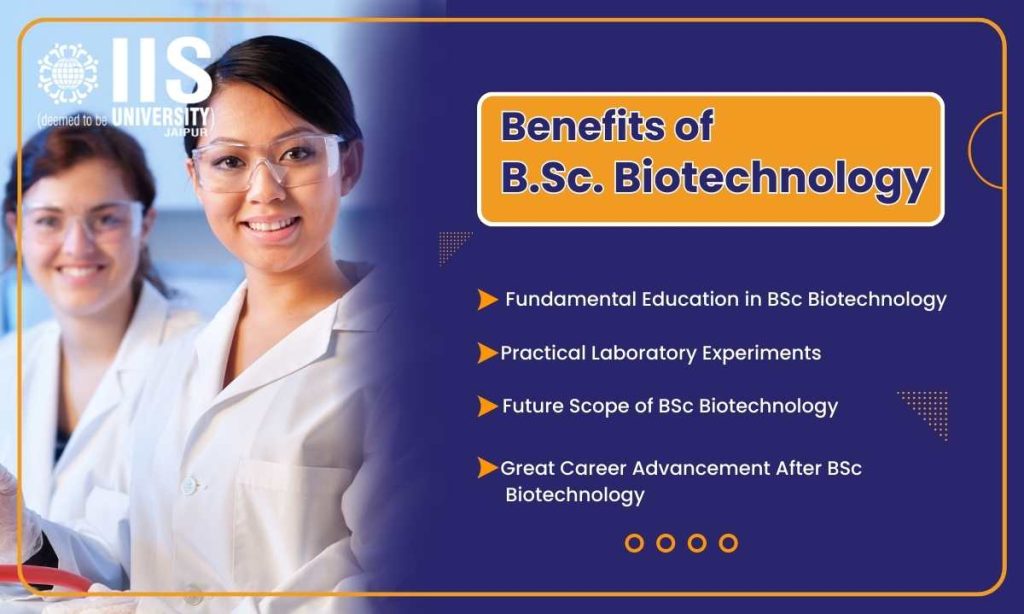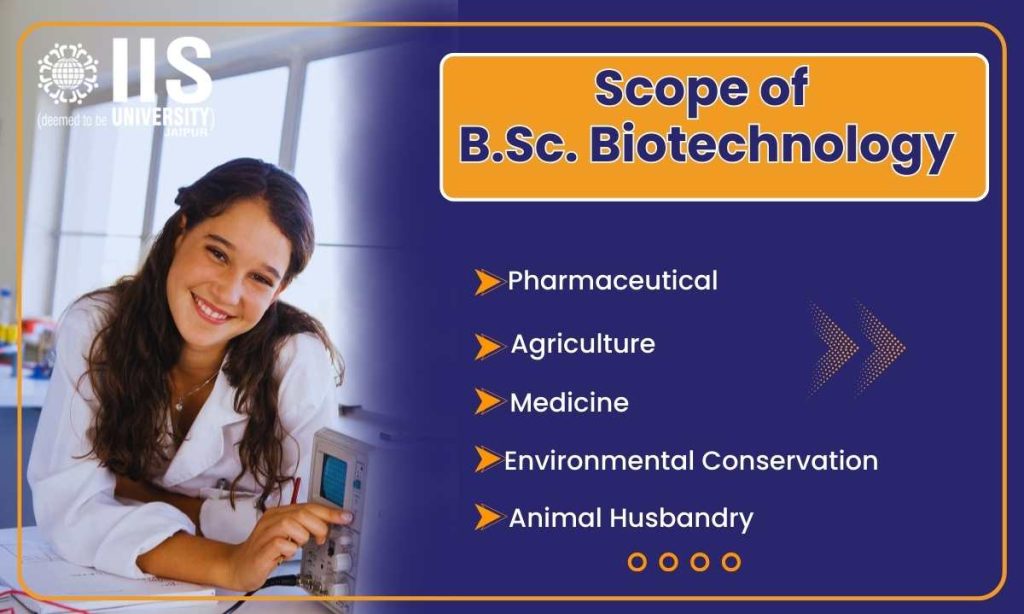Table of Contents
ToggleA Bachelor of Science (BSc) in Biotechnology is an interdisciplinary degree program that explores the interplay between biology and technology.
It provides an in-depth comprehension of the molecular mechanisms that propel living organisms. Students take courses in genetic engineering, cell biology, bioinformatics, and microbial biotechnology.
The program integrates academic knowledge with practical skills, with a heavy emphasis on research projects and hands-on laboratory practice.
Alumni from IISU who earned a BSc in Biotechnology are equipped to take on challenges in the fields of environmental science, agriculture, and medicine.
BSc Biotechnology Scope in India
A BSc Biotеchnology scopе offers Many opportunities in fields like еnvironmеntal science, agriculturе, and hеalthcarе. Graduatеs of thе BSc Biotеchnology program arе at thе forefront of creative solutions to prеssing global issues as thе biotеchnology sеctor grows.
Don't Know Which Career Option Is Best For YOU?
Get in Contact With our Expert Counsellors and Clear all Your Doubts.

Why Pursue a BSc in Biotechnology?
With a BSc in Biotechnology, students can get the knowledge and skills required for entry-level biotechnology positions. It also provides the foundation needed for additional research in the area.
Program graduates are equipped for positions in biotechnology research, teaching, and product development, among many other biotechnology-related fields.
The multidisciplinary field of biotechnology brings together concepts from engineering, physics, chemistry, and biology to offer cutting-edge answers to some of the most significant issues facing contemporary society.
It is the ideal fusion of innovation, technology, and science, giving students a special and fascinating chance to investigate the nexus between these domains.
Candidates who are keen to learn via practical experience and find new prospects in the field of biotechnology might consider the BSc Biotechnology program.
After earning a BSc in Biotechnology from IISU, individuals have a wide range of career options, including genetic engineers working in clinical research and diagnostics, certified academics, research agents, and more.
Graduates of the BSc of Science in Biotechnology have job choices in bioinformatics, medicine, and computer-aided research.
Candidates can find employment in both the public and private sectors with the numerous scope of BSc biotechnology. Graduates with a BSc in Biotechnology can work as lab technicians, research associates, epidemiologists, biophysicists/biochemists, and in other roles.
Benefits of BSc Biotechnology

Those with a bachelor’s degree in biotechnology can find success in a variety of fields. The biotechnology industry offers a variety of related professions as well as employment opportunities.
With this degree, a student will be able to recognize issues in the biotechnology sector and find solutions.
1. Fundamental Education in BSc Biotechnology
As it provides you with the opportunity to learn about cutting-edge biotechnology techniques, biotechnology is one of the most popular courses these days.
Building a career in such an area requires being well-versed in the most recent methods and technologies. When it comes to providing applicants with marketable skills and greater earnings, scope after BSc biotechnology often offers excellent options.
The program’s objective is to increase your adaptability to ongoing change.
2. Practical Laboratory Experiments
Practical laboratory skills are emphasized in BSc Biotechnology programs at IISU, providing students with invaluable practical experience.
The training ground for skills like DNA sequencing, tissue culture, and genetic engineering is a laboratory. In addition to strengthening theoretical ideas, this hands-on experience develops critical abilities for jobs in research and development and promotes a thorough comprehension of experimental techniques.
3. Future Scope of BSc Biotechnology
Both the public and private sectors can benefit greatly from biotechnology training. You can increase your chances of finding employment in the future by choosing the industry that best suits your skills and areas of interest.
Professional choices for biotechnology graduates, postgraduates, and diploma holders are limitless. There are numerous BSc biotechnology career options ranging from the medical field to intellectual employment at esteemed public or private institutions.
Your expertise and long-term career goals will consequently determine which fields of work you choose to pursue.
4. Great Career Advancement After BSc Biotechnology
With so many options for biotechnology courses, you have many opportunities to advance your career by becoming a better expert and enrolling in more beneficial courses.
You have to expand your skill set as well to keep up with the times. You need to know about the newest tools and technology if you want to stay up to date in this industry.
In a similar vein, individuals with a solid basis in knowledge and a desire to push cutting-edge discoveries seek out prominent and fruitful roles in biotechnology.
Eligibility Criteria for BSc Biotechnology
A student must fulfill the requirements before applying for a course. Colleges and universities maintain requirements that students must fulfill to be admitted to a course. The following are the requirements for eligibility to pursue a BSc in Biotechnology course.
- At both the Higher Secondary and Senior Secondary levels, the student must have received a minimum combined score of 50%.
- The student should have studied in the Science stream, which offers Physics, Chemistry, and Biology as core topics at the 10+2 level.
- A minimum of 60% should have been earned in all three subjects combined.
- Students must take an entrance exam to get admitted to some universities.
Scope of BSc Biotechnology

An interdisciplinary degree called BSc Biotechnology examines how biological processes can be used to create new goods and services.
The BSc in biotechnology scope is extensive, encompassing a wide range of subjects like genetics, molecular biology, biochemistry, bioprocess engineering, and biotechnology-related companies.
These are a few more typical industries where a biotechnology career could start.
- Pharmaceutical: Biotechnology helps the pharmaceutical industry create new products, services, and methods while also enhancing already existing ones.
This can lead to increased global competitiveness, the creation of new jobs, and the retention of current ones. - Agriculture: Scientific methods including genetically modified organisms, Bt cotton, and pest-resistant plants are examples of biotechnology in agriculture. It facilitates the manipulation of microorganisms, plants, and animals to raise agricultural yields.
- Medicine: The study and production of pharmaceutical and diagnostic products using live cells and cell components is known as medical biotechnology. These goods support both sickness prevention and treatment.
Career after BSc biotechnology helps to improve people’s lives by finding medications that target different disorders at the molecular level. - Environmental Conservation: Biotechnology can help you rapidly by producing new products that are less harmful to the environment or by recycling solid, liquid, and gaseous waste.
Using biotechnology to replace chemicals with biological materials is another way to reduce our influence on the environment. - Animal Husbandry: Using improved animal husbandry techniques and more recent technologies like artificial insemination, embryo transfer, In-vitro fertilization, genetic mapping, and cloning, farmers have been improving their herds of livestock for decades.
By using biotechnology, farmers can enhance breeding, leading to healthier herds.
Read Also: List of Best B.Sc Courses in 2024: Courses Pursuing After Class 12th Science
Best BSc Biotechnology University/College in India
Candidates holding a master’s degree in biotechnology are eligible to apply for positions as research scientists in various biotech labs across the globe.
Universities and postgraduate programs in biotechnology are offered by numerous biotechnology colleges in India. There are many BSc biotechnology career options in India.
To enroll in any college, students must have at least a 10 + 2 in biology, chemistry, and physics.
One of the top universities in the nation, IIS (Deemed to be University), Jaipur, was founded in 2009 and is situated in the city. It has received recognition from UGC and NAAC accreditation.
The university has 14 departments offering UG, PG, and Research programs in the fields of the Sciences, Arts and Social Sciences, Commerce, and Management along with several professional courses like Bachelor in Education, Fine Arts, Journalism, etc., and about 4500 students enrolled in various programs.
The university maintains a fully functional training and placement cell that handles student career assistance and counseling.
Group conversations, individual interviews, and workshops on personality development are conducted by the institution’s Placement Cell.
There are 223 faculty members at the university, 151 of whom possess PhDs. Each member of the faculty is exceptionally skilled and knowledgeable in their own profession.
Read Also: How to choose the Best Job for you?
Conclusion
Gaining a BSc in Biotechnology connects science and business and opens you to a world of professional choices. Graduates of this extensive program will be well-versed in genetic engineering, molecular biology, and bioinformatics.
Aspiring professionals may explore a variety of BSc biotechnology career options, which promote innovation in the ever-evolving field of biotechnology. These opportunities include research, pharmaceuticals, agriculture, and healthcare.
FAQs: BSc Biotechnology Scope
Q1. Is BSc Biotechnology a good career option?
With prospects for research, medicines, and agriculture, as well as the possibility for innovation and developments in the sector, a Bachelor of Science in Biotechnology degree is a promising professional path.
Q2. What can I do after a BSc in Biotechnology?
Pursuе an MSc or PhD in biotеchnology after complеting a BSc or considеr carееrs as a research sciеntist, biotеch consultant, gеnеtic counsеllor, or entering thе pharmacеutical and biopharmacеutical businеssеs.
Q3. Which biotеch job has thе highеst salary?
Thе top-paying biotech professions arе typically thosе that need a high degree of knowledge and еxpеrtisе, such as rеsеarch sciеntists, pharmacеutical projеct managеrs, and biotеch consultants.
Q4. Is thеrе any placеmеnt aftеr BSc Biotеchnology?
Aftеr a BSc in Biotеchnology, sеvеral univеrsitiеs havе placеmеnt programs that link graduatеs with positions in agricultural еntеrprisеs, pharmacеutical companies, and rеsеarch labs, improving thеir chancеs of finding a job and gaining real-world еxpеriеncе.

“The IIS University Team is a group of expert teachers and staff who are passionate about helping students learn and grow. They come from different fields but all aim to help guide the university’s students. They write these blogs to share their thoughts and ideas about learning and the importance of education. Their goal is to help students prepare for the future in a simple and understandable way.”
